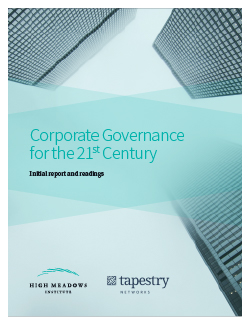As we move into the 21st century, the challenges facing corporate boards have grown dramatically. From expectations for board engagement and oversight of ESG to cybersecurity, boards face a growing range of complex issues and demands from shareholders and stakeholders. In 2017, HMI launched a research project with Tapestry Networks to explore the implications of the changing environment for the future of corporate governance. The objective was to produce a practical field guide that would analyze the challenges facing corporate governance and help companies and boards consider reforms to manage them. In preparing the guide, the research team interviewed and engaged with a diverse group of business and investment leaders and corporate directors across the U.S. to better understand their experiences and perspectives. To guide the development of the recommendations, the team worked with a steering group of investors, corporate directors and corporate governance experts. This included:
- Glenn Booraem and W. Robert Main, Investment Stewardship, Vanguard
- Carl Ferenbach, Chairman, High Meadows Foundation and High Meadows Institute
- Erroll Davis, Compensation Committee Chair, Union Pacific
- Raj Gupta, Chairman, Delphi Automotive
- Michelle Edkins, Global Head of Investment Stewardship, BlackRock
- Tom Manning, Lead Director, Dunn & Bradstreet
- Don Felsinger, Lead director of ADM and Northrop Grumman and Director at Gannett
- Ed Waitzer, Partner and Head of Corporate Governance Group, Stikeman Elliott
Our research found that the governance of major public companies is at the threshold of fundamental change, operating in a model that is becoming increasingly stressed. In the report, we detail what the key challenges are and both practical steps and larger systemic reforms that can help boards address them.



